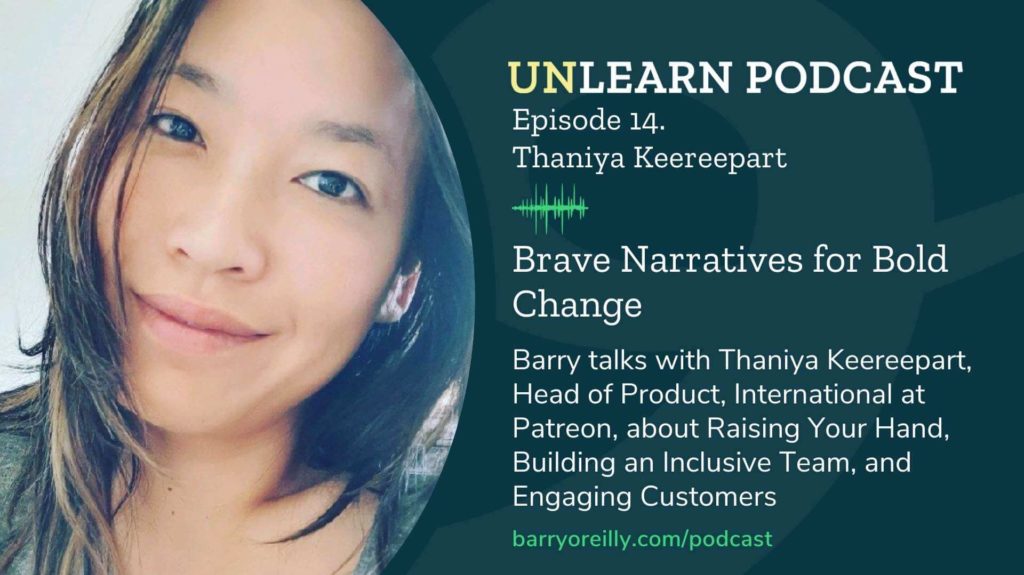This week’s guest is Thaniya Keereepart, Head of Product, International at Patreon. Thaniya joined Patreon after working with Major League Baseball (MLB) and TED, moving into the digital space. Listen to Brave Narratives for Bold Change with Thaniya Keereepart.

Raising Your Hand
Some people gravitate towards structure, but people like Thaniya thrive on unstructured paths. She says, “The through-line of all of my turning points has been that I have a habit of raising my hand to volunteer to do things I don’t really know how to do.” She credits her bravery to learning through doing: she understands how to iterate so she puts guardrails in place to learn what works and be flexible and adaptive when unintended consequences occur. [Listen from 1:30]
She relates how her MLB Gameday app crashed on Opening Day, with four million users online. That scary moment taught her how to handle live events. Something admirable about that environment, however, is that when anything broke, everyone came together to fix it. Barry notes that high-performance cultures focus on solving the problem and improving the system, rather than blaming an individual. This allows everyone to feel comfortable and give their best. [Listen from 5:15]
Building an Inclusive Team
When you’re building products for the masses, you want your team to reflect the diversity of your consumers. The best performing teams are usually the most diverse. Both Barry and Thaniya had to unlearn a great deal when they started working in diverse environments. Thaniya was used to working largely with males in college and at MLB, so there was a culture shock when she started at TED, but it opened her eyes to what it’s like to work in an environment with people of various backgrounds, cultures and genders. Barry says that he never saw the problem of a lack of diversity and inclusion until he started to work in San Francisco. He was in a bubble of sorts at Thought Works, his previous workplace since it was the norm to have a diverse workforce. He felt a call to action to share the values he learned at Thought Works in his new, male-dominated workplace. [Listen from 7:55]
Sharing a Beautiful Vision of the Future
It’s important to share a vision of the future. Thaniya believes in creating big change in small chunks, creating value that can be seen and felt immediately. She involves the teams that will benefit from the change in the product development phase. These teams then become champions of the new product. When you start small, Barry adds, you create evidence of the future you’re trying to build; you build trust and confidence that your big vision can come to life. It’s also important to anchor the big change with a beautiful narrative, says Thaniya. [Listen from 20:25]
Engaging Customers
Part of re-platforming includes building a change management system to set customer expectations. It’s unwise to have big changes foisted on your customers suddenly. Thaniya’s strategy at TED was to create excitement around the coming changes by inviting customers to be part of a beta program. They felt that they were helping to build TED’s new platform, which engaged them and made them champions of the coming change. [Listen from 24:30]
Creating a Movement of Change at Patreon
The patronage system evolved during the Renaissance; artists were supported by the people who appreciated their work. Over time, this practice died. The system today is to have a third party who stands in between creators and consumers that wields financial power and can manipulate both sides. Patreon wants to spark a change movement: the company believes going back to the patronage system will inspire content creators to make more diverse content when fans support them to come up with new ideas. However, changing consumer behavior at massive scale is hard, Thaniya says. As such, the present system will persist before Patreon’s vision comes to full life. [Listen from 27:00]
Start Your Unlearning Journey
Unlearn: Let Go of Past Success to Achieve Extraordinary Results by Barry O’Reilly
Get notified of new podcasts and be the first to get access to Barry’s latest case studies, tools and techniques by joining his award-winning newsletter















